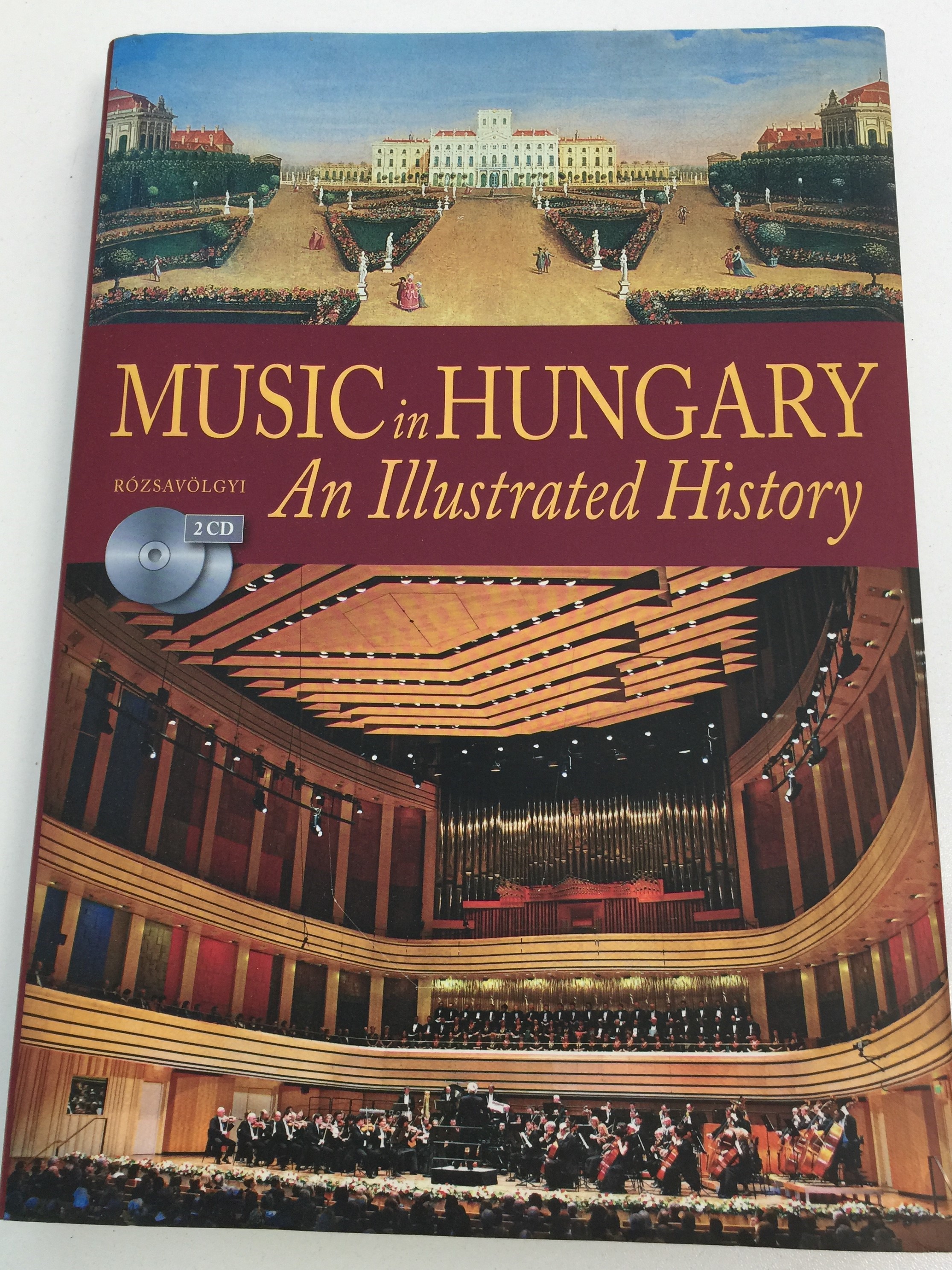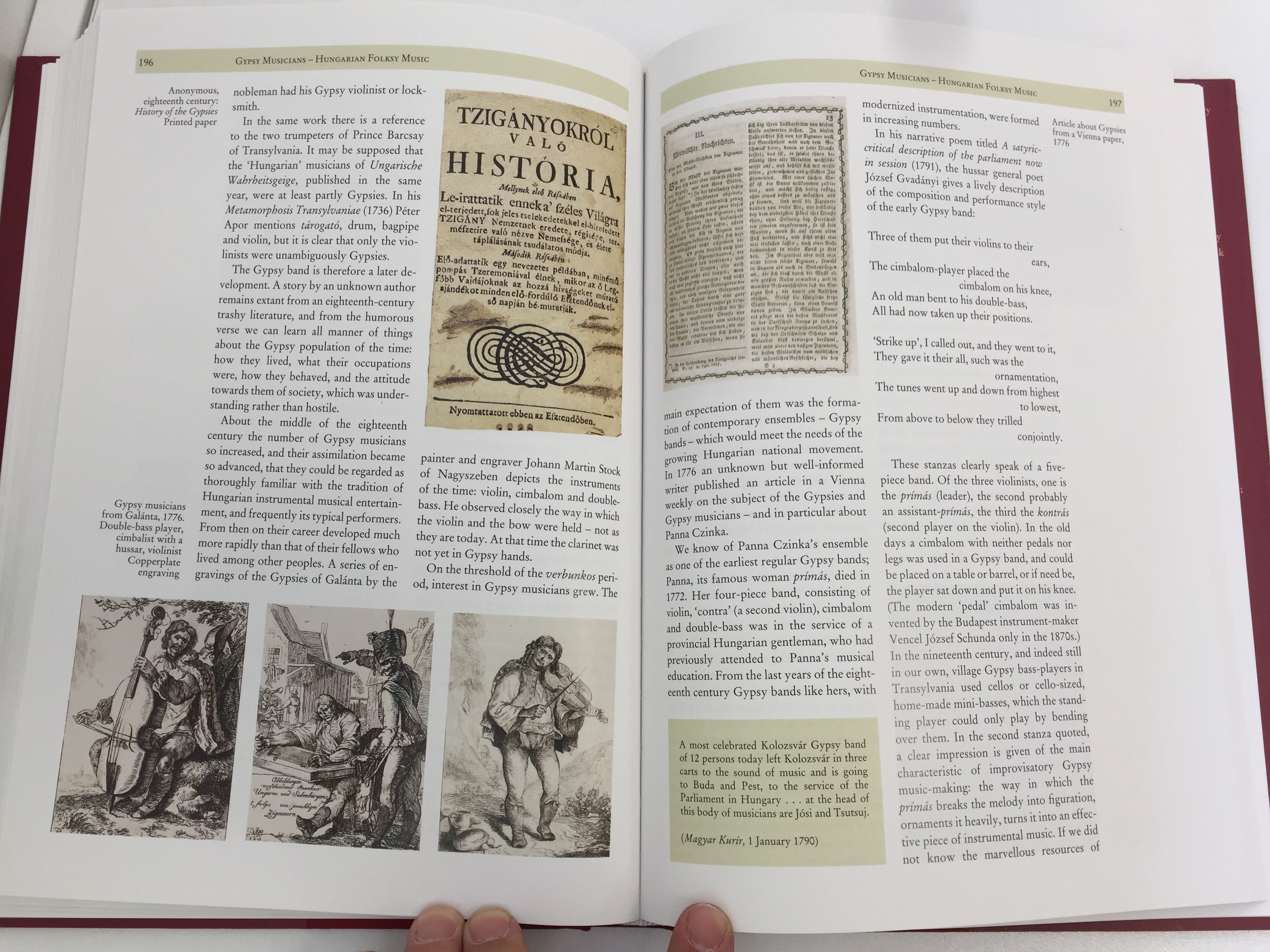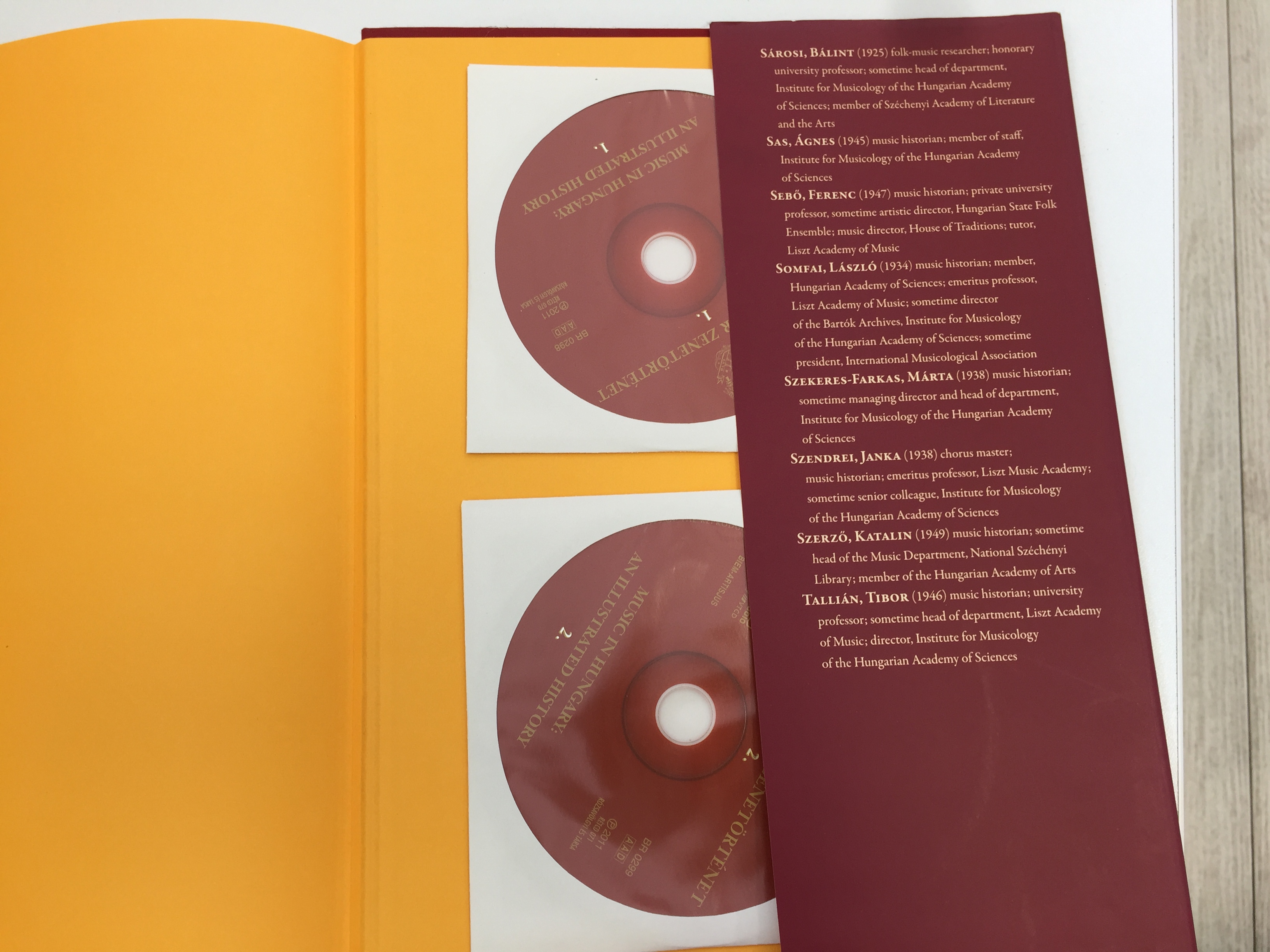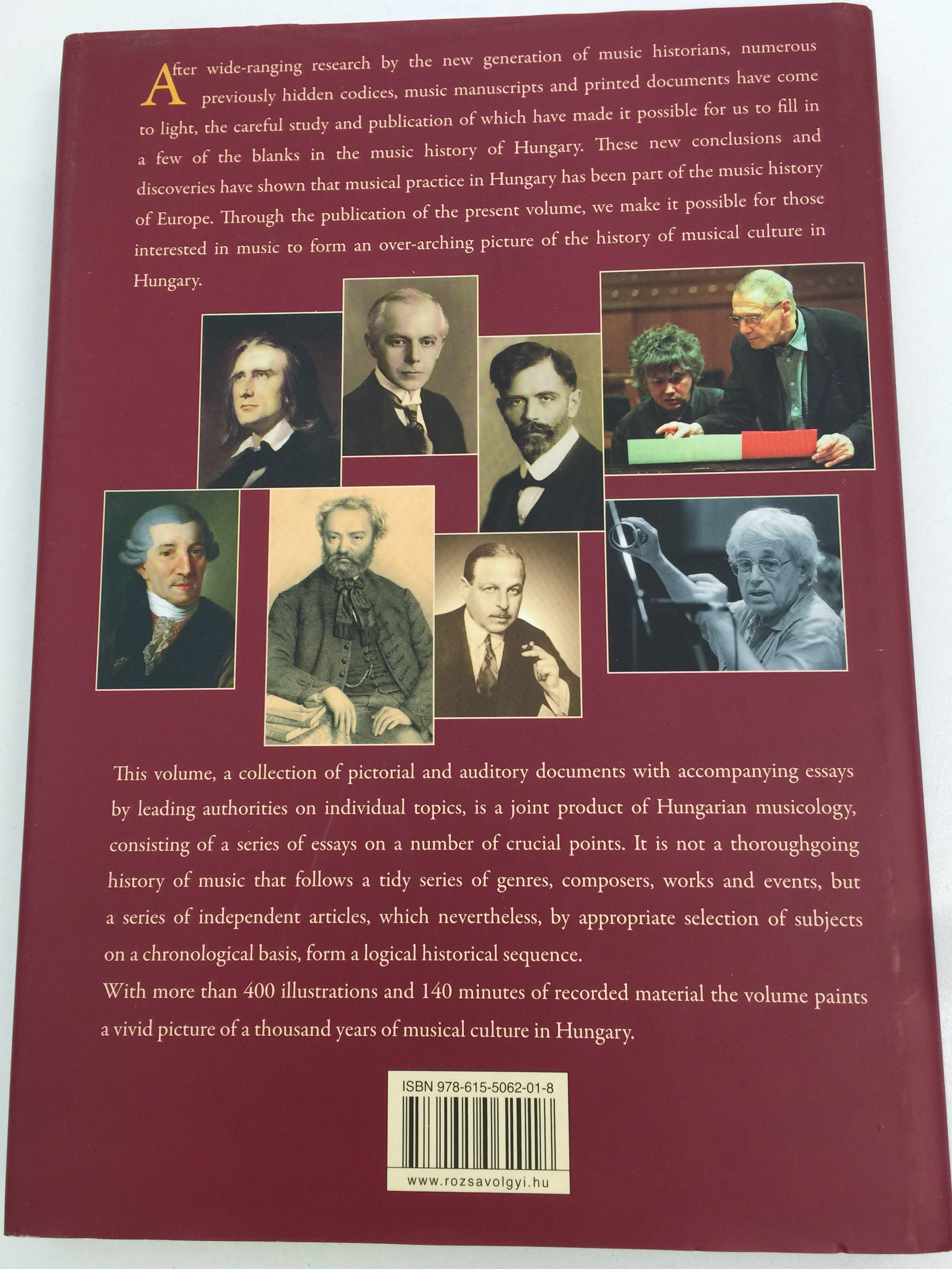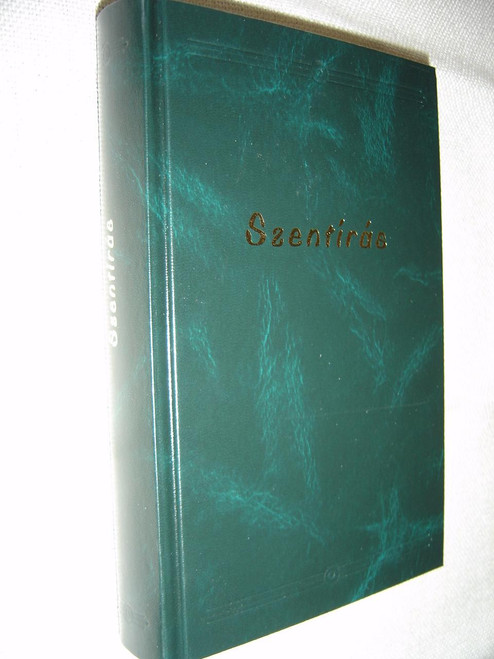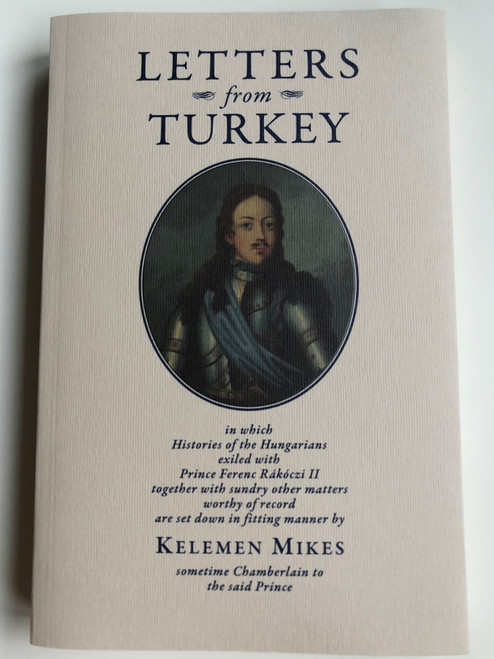Product Overview
Music in Hungary - An Illustrated History by Batta András, Eckhardt Mária, Kárpáti János / Hardcover book with 2 CDs / Translated by Bernard Adams / Rózsavölgyi és Co. 2011 / Képes magyar zenetörténet Angol kiadás
Hardcover 2011
ISBN: 9786155062018 / 978-6155062018
ISBN-10: 6155062013
PAGES: 320
PUBLISHER: Rózsavölgyi és Co
LANGUAGE: English / Angol
Contains 2 Audio CDs
English Description:
After wide-ranging research by the new generation of music historians, numerous previously hidden codices, music manuscripts and printed documents have come to light, the careful study and publication of which have made it possible for us to fill in a few of the blanks in the music history of Hungary. These new conclusions and discoveries have shown that musical practice in Hungary has been part of the music history of Europe. Through the publication of the present volume, we make it possible for those interested in music to form an over-arching picture of the history of musical culture in Hungary. This volume, a collection of pictorial and auditory documents with accompanying essays by leading authorities on individual topics, is a joint product of Hungarian musicology, consisting of a series of essays on a number of crucial points. It is not a thoroughgoing history of music that follows a tidy series of genres, composers, works and events, but a series of independent articles, which nevertheless, by appropriate selection of subjects on a chronological basis, form a logical historical sequence. With more than 400 illustrations and 140 minutes of recorded material the volume paints a vivid picture of a thousand years of musical culture in Hungary.
Hungarian Summary:
A magyarországi zene története a római kortól napjainkig, mely a zenetörténeti csúcspontokat mutatja be. Szerzői a magyar zenetudomány kiemelkedő képviselői, akik az egyes zenei korszakok (középkor zenéje, reformáció és ellenreformáció, városok zenéje, népzene, operettmuzsika stb.) és kiemelkedő zenei nagyságok (Bakfark Bálint, Joseph Haydn, Liszt Ferenc, Erkel Ferenc, Bartók Béla, Kodály Zoltán, Ligeti György) jelentőségét vizsgálják. A könyvet több mint 400 színes kép és 140 percnyi hangzó anyag illusztrálja.
Kárpáti János zenetörténész szerkesztette a könyvet, 19 magyar zenetörténész írta a tanulmányokat.
About the Editor:
JÁNOS KÁRPÁTI is Head Librarian and Professor of Musicology at the Budapest Academy of Music. He is also Chairman of the national branch of IAML, and President of the Hungarian Musicological Society.
In his volume Bartók’s String Quartets, Kárpáti proposed a novel analytical approach to Bartók’s style (an extended version entitled Bartók’s Chamber Music was published by Pendragon Press). Professor Kárpáti was also among the first to acknowledge the manifold connections that linked Bartók’s music to that of his contemporaries, a notion suppressed in the 1950s through pressure on Hungarian musicology, as a result of the Stalinistic aesthetic doctrine. In 1963 Kárpáti published a book on the music of Arnold Schoenberg, still at that time a daring undertaking. Other studies include his Bartók-Schoenberg-Stravinsky (1976). Kárpáti has for decades been one of the leading critics and analysts of contemporary Hungarian and other music. His work on the historiography of Eastern European music was honored by the International Music Council which called upon him to act as the regional coordinator and contributor to its project, the Universe of Music, a History (UHM).
The Budapest music publisher, Rózsavölgyi and Company, has published a new book titled as above. The rich content of the book is drawn from a catalogue of a 2001 exhibition at the Budapest Historical Museum (in the former Royal Palace at the Buda Castle) under the title of ”Symphonia Hungarorum” – One Thousand Years of Hungarian Musical Culture (In 2000, Hungary celebrated the millennium of the founding of the Kingdom/State of Hungary in the year 1000 A.D. by King Stephen I) The album-sized catalogue was published in Hungarian. A revised version was published in hardcover in 2004, also in Hungarian (Képes magyar zenetörténet – An Illustrated History of Hungarian Music. Fortunately, the second, enlarged edition has also been published in English translation this year (2011), edited by Professor János Kárpáti, a musicologist and former Director of the Library of the Franz Liszt Academy of Music. (Of course, he was also the curator of the exhibition ten years ago as well as the editor of the earlier publications).
The authors of each of the chapters are the most recognized experts in the various fields and epochs of Hungarian music history. Based on the concept of the editor, the book gives a very wide horizon both historically and culturally. Through it, we obtain a detailed picture about special ‘Hungarianisms’ as well as the presence of European musical standards and musical life during the many stormy centuries of Hungary. Even a cursory glance at the Table of Contents indicates that the book contains a never-before-seen historical view of Hungarian music and musical life. Results of the most recent research are reflected in the studies.
The editor’s Preface is followed by an Introduction entitled Musical Histories of the Former Hungary by Tibor Tallián. The individual essays are as follows: Melinda Kaba, The Carpathian Basin before the Hungarian Conquest; János Kárpáti, ‘Symphonia Hungarorum’ – The Legend of Bishop Gerard; László Dobszay and Janka Szendrey, Hungarian Gregorian Chant; Márta Szekeres-Farkas, Music at the Royal Courts; Géza Papp, The Chroniclers of the Turkish Occupation; Péter Király, An Internationally Renowned Virtuoso from Hungary— Valentin Bakfark [lutenist]; Ilona Ferenczi, Music of the Reformation and Counter-Reformation Periods; Ágnes Sas, Court Music of the Esterházy Princes; Zoltán Farkas, The Music of Towns in Eighteenth-century Hungary; László Felföldi and Géza Papp, Hungarian Dances from Ungaresca to Csárdás [16th-19th centuries]; Tibor Tallián, National Theater – National Opera; Mária Eckhardt, Franz Liszt on the Path to Hungarian Music; Katalin Szerző, Musical Life in the Age of Dualism [last decades of the 19th century]; Bálint Sárosi, Gypsy Musicians – Hungarian Folk-like Music; András Batta, Austro-Hungarian Operetta under the Monarchy; Ferenc Sebő, The Discovery of Peasant Music; László Somfai, Béla Bartók: One of the Greats of the Twentieth Century; László Eősze, National Characteristics – Universal Values: Zoltán Kodály; Anna Dalos, Another Twentieth Century; András Batta:, World-renowned Hungarian Performing Art.
CD 1 Tracklist
CD 1 (68’32”)
1 Pindar’s Ode to Apollo ~ The Aquincum Organ 1:39"
2 Introitus: Rorate coeli 2:06" - Schola Hungarica, conducted by Laszlé Dobszay
3 Antiphon: O Rex gloriose 2:17" - Schola Hungarica, conducted by Janka Szendrei
4 Peire Vidal: Bem pac d’ivern e d’estin 3:30” - Ferenc Sebő (voice), Fraternitas Musicorum
5 Oswald von Wolkenstein: Du ausserweltes schons 1:38” Les Menestrels — Wiener Ensemble für alte Musik 1
6 Jacques Barbireau: Ax travail suis 1:59” Melinda Lugosi, Boldizsar Keonch, Matyas Antal (voices) Camerata Hungarica, conducted by Laszlé Czidra
7 Sebestyén Tinddi: Egri historidnak summája The 1:26” Account of Eger - fragment) Péter Kertész (voice), Daniel Benké (lute)
8 Ferenc Wathay: Chant XXIII - Aldott magyar nemzet 1:57” (Blessed Hungarian Nation — fragment) Péter Kertész (voice), Csaba Szijjartd (hurdy-gurdy)
9 Valentin Bakfark: Fantasia I (for four parts) 5:15" Daniel Benké (lute)
10 From Gal Huszar’s Hymnal (1574): © kegyelmes 3:19” Jézus Krisztus (O merciful Jesus Christ) The Debrecen College Cantus, conducted by Sandor Berkesi
11 From The Anna Hansen Schuman Codex: Dies est 3:07” laetitiae - Cantio Schola Hungarica, conducted by Laszlé Dobszay
12 Pal Esterhazy: Harmonia caelestis - Jesu, dulcedo 1:49 Maria Zadori (soprano), Capella Savaria, conducted by Pal Németh
13 Joseph Haydn: Baryton Trio D major (Hob: X1:45)- 5:45" Adagio Balazs Kakuk (baryton), Péter Lukacs (viola), Tibor Parkanyi (cello)
14 Joseph Haydn: L’infedelta delusa (Hob: XXVIIS)- 4:54” Duetto: Son disperato Magda Kalmir, Jozsef Gregor (voices), Liszt Ferenc Chamber Orchestra, conducted by Frigyes Sandor
15 Georg Druschetzky: Missa Solemnis in C - Sanctus 1:17 Ingrid Kertesi, Katalin Gémes, Gabor Kallay, Akos Ambrus (voices), Tomkins Vocal Ensemble, Weiner-Szisz Chamber Orchestra, conducted by Janos Dobra
16 Benedek Istvanffy: Missa Sanctae Dorotheae (1774)- 5:58” Kyrie Schola Hungarica, Liszt Ferenc Chamber Orchestra, conducted by Laszlé6 Dobszay
17 Hungarian dances from the Vietonss tablature book 4:41 Mandel Quartet
18 Ferenc Erkel: Bank ban - Melinda’s aria, Act Ul: 3:34” Ölj meg engem, Bank (Kill me, Bank) Karola Agay (soprano), Budapest Philharmonic Orchestra, conducted by Janos Ferencsik
19 Liszt Ferenc: The Legend of Saint Elizabeth - Ó, alom 2:31” a gyermekkorrdl! (O Kindheitstraum!) Marton Eva (ének), Allami Hangversenyzenckar,
vezényel Joo Arpad
20 Franz Liszt: Hungarian Historical Portraits — István Széchenyi 3:01 Lajos Kertész (piano)
21 Mihaly Mosonyt: Ave verum 3: 07 Franz Liszt Choir and Orchestra, Amsterdam, conducted by Peter Scholez
22 Karoly Goldmark: Die Konigin von Saba - March 2:55" from Act I Orchestra of the Hungarian State Opera, conducted by Adam Fischer
CD 2 (72:11)
1 Janas Bihan: Mikor a penze elfogyott (When his money is all gone) Lajos Boross and his Gypsy Band 2:58
2 Mark Rézsavélgyi: Elso magyar tarsas tancz (First Hungarian Ballroom Dance) Festetics String Quartet 7:35
3 Ferenc Lehar: A mosoly orszdga (Das Land des Lachelns) — Mi’s entrance 3:13 Erzsébet Hazy (soprano), Orchestra of the Budapest Operetta Theater, conducted by Tamas Brédy
4 Ropuly páva, ropülj (Fly, peacock, fly); folk song, Surd, 0:39” TransdanubiaPál Varga (voice)
5 Madárka, madárka, ne zavard a vizet (Little bird, don’t disturb the water); folk song, Lészped, Moldova Demeter Antalné Anna Jané (voice) 1:19
6 Wedding at Szék (Szék, Romania) Marton Ferenczi ,Zsuki” and his Band 2:49”
7 Béla Barték: Suite op. 14 (Sz 62, BB 70) 7:50” Béla Bartok (piano, archive recording)
8 Zoltan Kodaly: Norvég leényok (Norwegian Girls) 2’58” Chamber Chorus of Pécs, conducted by Aurél Tillai ©
9 Erné Dohnanyi: Valtozatok egy gyermekdalra 4:40” (Variations on a Nursery Tune) ~ Variation No. 11 and Finale Zoltan Kocsis (piano), Budapest Festival Orchestra, conducted by Ivan Fischer
10 Led Weiner: Csongor es Tiorde, Suite — North Hungarian Symphony Orchest ary Dance conducted by Laszlo Kovacs
11 Andras Szdllésy: Fubuela Phaedri The King’s Singers
12 Gyorgy Ligeti: Sippal, dobbal, nadihegedűvel (Pipes, Drums, Fiddles) egeduvel
On poems of Sandor Weores
I. Fabula (Fable)
II. Tancdal (Dance Song)
III. Kinai templom (Chinese Temple)
IV. Kuli (Coolie)
Vv. Alma alma (Dream)
VI. Keserédes (Bitter-swect)
VII, Szajkó (Parakeet)
Katalin Kérolyi (mezzo-soprano), Amadinda, Percussion Group
13 Gyérgy Kurtég: Kafka Fragments, Part I (1-19) 15:16
1. Die Guten - 2. Wie cin Weg im Herbst -
3. Verstecke - 4. Ruhelos - 5. Berceuse I -
6. Nimmermehr - 7. "Wenn er mich immer fragt’ -
8. Es zupte mich jemand am Kleid -
9. Die Weissnarinnen - 10. Scene am Bahnhof -
11. Sonntag, den 19 Juli 1910 (Berceuse II) - 12. Meine
Ohrmuschel... - 13. Einmal brach ich mir das Bein
(Chassidischer Tanz) - 14. Umpanzert ~ 15. Zwei
Spazierstécke (Authentisch—-Plagal) — 16. Kleine
Riickkehr — 17. Stolz (1910/15. November, zehn
Uhr) - 18. Triumend hing die Blume (Hommage a
Schumann) — 19. Nichts dergleichen Adrienne Csengery (soprano), Andras Keller (violin)




























